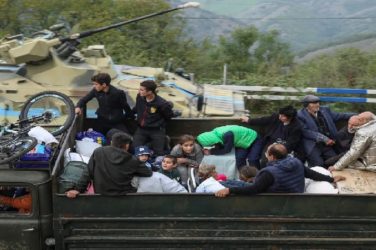The media in Tunisia and Italy reported news about a migration agreement reached on August 17, 2020, following the visit of the Italian foreign and interior ministers, accompanied by European commissioners Ylva Johansson and Oliver Varhelyi.
Yet, specific details of the deal were few and far between. Last October, civil society organisations in Italy and Tunisia asked their governments to be granted access to official documents connected with the recent agreement between the two countries on the issue of migration, saying that “the outsourcing of border control leads to systematic violations of migrants’ rights.”
On November 25, 2021, a Rai News 24 investigative report unveiled that the two sides concluded a migration agreement but the content and text have never been communicated to Tunisian and Italian taxpayers.
According to a document revealed by the report, the agreement includes multi-million-euro direct funding for Tunisia in exchange for a commitment by Tunisian authorities to accept repatriating its migrants.
This financial deal includes eight million euros for Tunisia’s Coast Guard and the creation of a 30-million-euro fund over a three-year period (2021-2023) to help Tunisia combat migration.
As early as 2020, Italy’s foreign minister Luigi Di Maio had said that his country would start sending irregular Tunisian migrants back to their home “as of August 10, 2020” and noted that “80 people will be expatriated every week”.
Despite civil society objection and popular criticism, Tunisian president Kais Saied, who grasped all the powers in his hands in a July 25 move, accepted the repatriation of irregular Tunisian migrants in France and Italy.
On December 16, Italy’s Interior Ministry said that out of the 63,246 migrants who had arrived in Italy so far in 2021, 24 percent of them were Tunisians. Since the beginning of 2021, Italy has been deporting an average of 129 Tunisians every week, raising the total to about 5,000 so far.
“I have never seen so many Tunisian nationals repatriated so quickly from the removal centre (CPR) in Turin,” commented Maurizio Veglio, an Italian migrants’ rights lawyer.
“Everything happens in a very short time. They enter a removal centre, are taken before a Justice of the Peace and, within a few days, they are flown to Palermo for identification purposes and then returned directly to Tunisia,” he further explained.
A recurrent lack of transparency
More than the deal’s content and dangerous consequences, what the Associazione Studi Giuridici sull’Immigrazione (ASGI), the Forum Tunisien pour les Droits Économiques et Sociaux (FTDES), and Avocats sans Frontières (ASF) has evoked in their formal complaint to the governments of both countries is the lack of transparency in dealing with a so sensitive issue.
Tunisia has, in fact, a tradition of remaining silent about migration deals.
In March 2014, Tunisia signed agreements with the EU for the return of illegal Tunisian immigrants and to permanently host asylum seekers from other African countries. But since then, Tunis has always denied those deals, known as the EU-Tunisia Mobility Partnership – ratified by the European Union, ten EU member states and the then Tunisian ambassador to Belgium and the European Union, Tahar Cherif.
The agreement was meant to support practical cooperation between Tunisia and EU member states on several relevant issues, such as the returns of those who “irregularly” migrated to Europe, the reintegration of returnees readmitted by Tunisia and the development of Tunisia’s cooperation on readmission with relevant African countries.
To improve the management of migration, the EU also promised to support the development of a Tunisian biometric registry of the population.
In line with the Valletta Action Plan, announced at the Valetta Summit on Migration (November 2015), Tunisia was, additionally, chosen to be a pilot country for the identification and implementation of legal migration schemes.
The European Commission has also proposed €500 million in additional macro-financial assistance, to be disbursed in 2016 and 2017.
What’s behind Kais Saied’s discretion?
“There is no written agreement between Saied and the Italian government, let alone published or readable,” an Italian press freedom advocate, who chose to remain anonymous, told The New Arab.
“On the other hand, the migration agreement continues to work wonderfully for Italy and Tunisia with repatriation journeys secured two or three times a week and the hotline set up to warn of migrant departures from Tunisia,” the analyst added.
“Although Tunisia has now started to accept repatriation from France again, the agreement works perfectly with Italy but less with France as Tunisia has particular political ties reserved with France and maybe because Italy pays well, as it does with Libya, and France does not.”
The debate about Tunisia hosting permanent refugees on its soil is ongoing but has not yet turned into a public-opinion one.
Since 2011, but especially since the election in 2014 of President Béji Caïd Essebsi, migration was a regular point on the agenda of high-level meetings with the Tunisian authorities and civil society.
Bilateral commitments under the Mobility Partnership include the opening of negotiations on a visa facilitation agreement and a readmission agreement. These negotiations with Tunisia were due to begin on October 12, 2016, but they never did.
In February 2017, at a joint presser with Chancellor Angela Merkel in Berlin, former Prime Minister Youssef Chahed (2016-2020) formally denied that Tunisia has concluded any deal with Germany concerning the establishment of refugee camps on its soil.
The debate about Tunisia hosting permanent refugees on its soil is ongoing but has not yet turned into a public-opinion one.
Since 2011, but especially since the election in 2014 of President Béji Caïd Essebsi, migration was a regular point on the agenda of high-level meetings with the Tunisian authorities and civil society.
Bilateral commitments under the Mobility Partnership include the opening of negotiations on a visa facilitation agreement and a readmission agreement. These negotiations with Tunisia were due to begin on October 12, 2016, but they never did.
In February 2017, at a joint presser with Chancellor Angela Merkel in Berlin, former Prime Minister Youssef Chahed (2016-2020) formally denied that Tunisia has concluded any deal with Germany concerning the establishment of refugee camps on its soil.
Mourad Teyeb is a Tunisian journalist, researcher and consultant based between Tunisia and Libya.
Follow him on Twitter: @MouradTeyeb
Mourad Teyeb – 10 February, 2022





